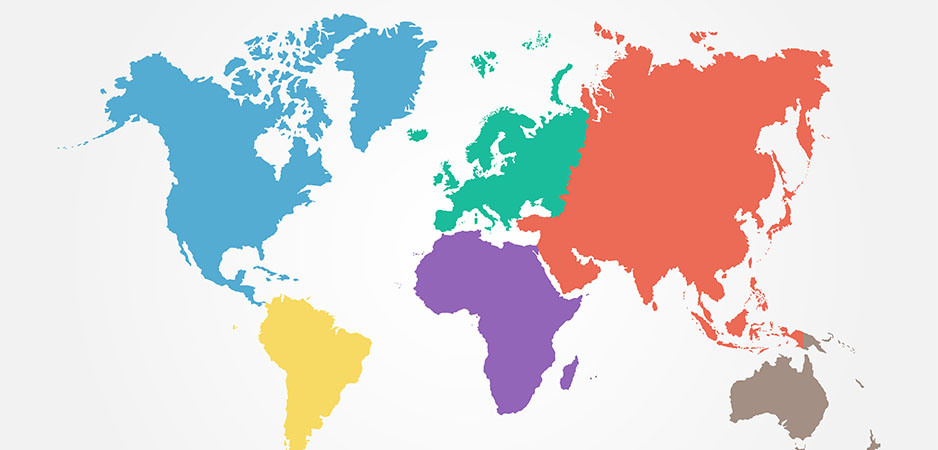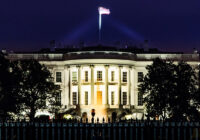What does “region” mean from an American perspective?
An article by Fred Kaplan in Slate makes the case for maintaining a dominant position for the US in world politics. As evidence, he cites the opinion of Stanford University Professor Daniel Sneider: “People describe the U.S. as being in long-term decline, and while some officials talk about alternative arrangements—for instance, building their own nuclear arsenals—they are not ready to seriously contemplate a world where the U.S. is not the dominant power in the region.”
One is left wondering what Sneider means by “dominant power in the region.” To clarify, we therefore offer today’s 3D definition of “region” from the US perspective.
Region:
The world when referred to by Americans or a geographical segment of the world when referred to by everyone else
The literal meaning of Sneider’s sentence is clear. The leaders of countries in any part of the globe are aware of existing within a region. They presumably expect the US to be the dominant power in their region. Because these countries are on every continent, if the US is “the dominant power in the region,” the US is the dominant power everywhere. Ipso facto, the world is the region of the USA.
Contextual note
In his conclusion, Kaplan refers to what might be called the nostalgia (pining) of foreign regimes for the American leadership of past years — excluding the George W. Bush years, which he singles out as exceptional due to the administration’s neocon ideology. “Trump has made many foreigners pine for the America that once was, rather than dismiss us out of hand, if only because they realize they can’t get by as well as they’d like without us.”
Could this be projection on Kaplan’s part? Are the “many foreigners” he cites simply people he knows? Has he interviewed foreign leaders to measure the degree of their pining? This sound more like the pining of Kaplan himself, a New Democrat regretting “the America that once was,” which we can only presume is the America of Bill Clinton and Barack Obama.
His final sentence follows from the one cited above: “Which means the affection, or the trust, or at least the bedrock perception of reliability might be regained, to some extent, after [Trump]’s gone.”
The irony becomes very nearly comic here. It sounds like a Democrat’s formulation of “Make America Great Again.” Is this what we can expect to be hearing in the 2020 campaign?
Historical note
Contrary to what Sneider implies, the historians who speak of America’s “long-term decline” focus on its decline as an empire, a term neoliberal New Democrats steer clear of, but whose importance in the analysis and writing of history today that Alfred McCoy insists on. For example, the point that McCoy, the author of In the Shadows of the American Century: The Rise and Decline of U.S. Global Power, makes is that once outed by historians as an empire rather than — from the Cold War perspective of US culture — as the world’s policeman, it becomes impossible to return to its imperial status.
 The secret is out. The image is definitively broken. A comparison with Harvey Weinstein’s effect on the cultural empire of Hollywood entertainment might be fitting. No one doubts that Hollywood will continue to make the most successful movies for global consumption, but the perception of how masculine power works in Hollywood has definitively changed.
The secret is out. The image is definitively broken. A comparison with Harvey Weinstein’s effect on the cultural empire of Hollywood entertainment might be fitting. No one doubts that Hollywood will continue to make the most successful movies for global consumption, but the perception of how masculine power works in Hollywood has definitively changed.
Kaplan’s hopes “the bedrock perception of reliability might be regained,” presumably once a good Democrat moves into the White House. It’s true that the decline McCoy describes was precipitated by Bush’s adventurous policies in the Middle East. But it continued, and even accelerated, under the “good Democrat” Obama, whom McCoy deems a “geopolitical genius” — the president with the greatest understanding and vision of geopolitics whose “brilliant manipulation of abstractions” nevertheless failed to take into account what McCoy calls “the human equation.”
With an equal level of abstraction Kaplan writes, “there is no country or set of countries, other than the United States, that has the resources, breadth of interests, or experience necessary to preserve and protect the global order.” The Daily Devil’s Dictionary hopes that Kaplan himself, or a competent lexicographer who has sufficiently examined the thinking of people like Kaplan, will someday provide us with the definition of “the global order” he wishes to “preserve and protect.” We remember George H.W. Bush’s “new world order,” which barely lasted a decade. Can that be what he is pining for?
*[In the age of Oscar Wilde and Mark Twain, another American wit, the journalist Ambrose Bierce, produced a series of satirical definitions of commonly used terms, throwing light on their hidden meanings in real discourse. Bierce eventually collected and published them as a book, The Devil’s Dictionary, in 1911. We have shamelessly appropriated his title in the interest of continuing his wholesome pedagogical effort to enlighten generations of readers of the news.]
The views expressed in this article are the author’s own and do not necessarily reflect Fair Observer’s editorial policy.
Photo Credit: Puwadol Jaturawutthichai / Shutterstock.com
Support Fair Observer
We rely on your support for our independence, diversity and quality.
For more than 10 years, Fair Observer has been free, fair and independent. No billionaire owns us, no advertisers control us. We are a reader-supported nonprofit. Unlike many other publications, we keep our content free for readers regardless of where they live or whether they can afford to pay. We have no paywalls and no ads.
In the post-truth era of fake news, echo chambers and filter bubbles, we publish a plurality of perspectives from around the world. Anyone can publish with us, but everyone goes through a rigorous editorial process. So, you get fact-checked, well-reasoned content instead of noise.
We publish 2,500+ voices from 90+ countries. We also conduct education and training programs
on subjects ranging from digital media and journalism to writing and critical thinking. This
doesn’t come cheap. Servers, editors, trainers and web developers cost
money.
Please consider supporting us on a regular basis as a recurring donor or a
sustaining member.
Will you support FO’s journalism?
We rely on your support for our independence, diversity and quality.






